

<< Go Back up to Region ‘Los Angeles: Downtown’
| Follow Mike Hume’s Historic Theatre Photography: |  |
 |
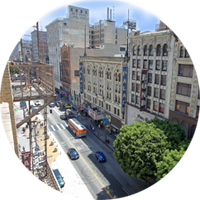
First Listed on the National Register of Historic Places: 9th May 1979
Listing Updated on the National Register of Historic Places: 12th April 2002
Address: South Broadway, Los Angeles, CA 90014 
The Broadway Theater & Commercial District in Downtown Los Angeles is the first and largest historic theatre district listed on the National Register of Historic Places  . With 12 movie theatres/palaces located along a seven-block stretch of Broadway, it is the only large concentration of movie palaces left in the United States.
. With 12 movie theatres/palaces located along a seven-block stretch of Broadway, it is the only large concentration of movie palaces left in the United States.

 Detailed Information
Detailed Information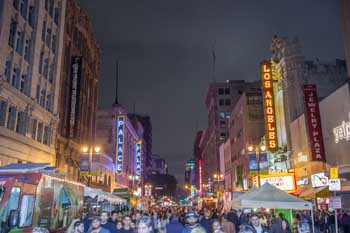
The historic district runs along South Broadway in Downtown Los Angeles. Pre-dating it is the Main Street theatre district where many nickelodeons and small theatres existed at the start of the 20th century. Many of these theatres switched to movies in the early 20th century, but the grand movie palaces being built a couple of streets west on Broadway drew the crowds away with their larger screens and opulent surroundings.
By 1931, when Broadway’s last movie palace was built, there was capacity for more than 15,000 patrons nightly. Broadway had the highest concentration of movie theatres in the world, with theatres ranging in capacity from several thousand down to 900. The largest theatre by seating capacity was the State Theatre at 2,404 seats, and the smallest was the Tower Theatre at 906 seats.
Broadway was the hub of LA’s entertainment scene, a place where “screen goddesses and guys in fedoras rubbed elbows with Army nurses and aircraft pioneers”.
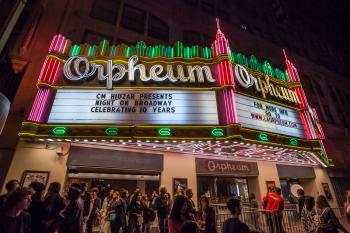
In the 1950s and 1960s the downtown area entered a general decline as a result of many people moving out to the suburbs and the rise of television. Local neighborhood theatres became much more popular.
Many of the Broadway theatres turned to exhibiting newsreels, Spanish language / Spanish-dubbed films and entertainment, soft porn, or any combination of the above. Had it not been for the activities of the Hispanic community many of the Broadway theatres would probably not have survived.
The area was listed on the National Register of Historic Places  in May 1979 as the Broadway Theater & Commercial District, a six-block stretch of Broadway from 3rd St to 9th St.
in May 1979 as the Broadway Theater & Commercial District, a six-block stretch of Broadway from 3rd St to 9th St.
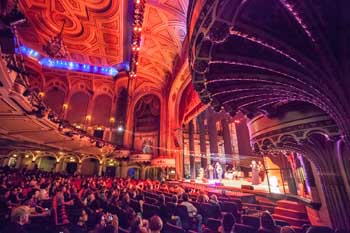
With the closure of many theatres in the 1980s, alternative tenants and uses were sought. Churches moved into some spaces (notably the State and United Artists theatres), with other theatres such as the Globe Theatre being given over to swap meets, a fate which almost befell the Tower Theatre as well. Some of the theatres also became regular fixtures as locations for Los Angeles movie and television shoots.
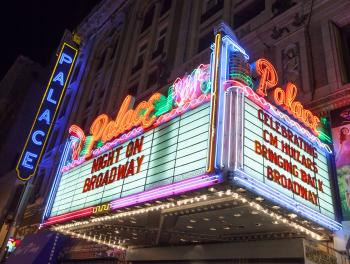
In the late 1980s Broadway started to receive some preservation attention. In 1987 the Los Angeles Conservancy  commenced a program called “Last Remaining Seats”
commenced a program called “Last Remaining Seats”  , in which the old movie palaces were opened each summer to screen classic Hollywood movies. 31 years later, “Last Remaining Seats” is still going strong and regularly selling-out theatres during its summer run.
, in which the old movie palaces were opened each summer to screen classic Hollywood movies. 31 years later, “Last Remaining Seats” is still going strong and regularly selling-out theatres during its summer run.
In 2002 the listing on the National Register was amended to extend the historic district by approximately half a block in both directions, resulting in the district stretching from approximately 250 Broadway at the north end (between 2nd and 3rd Streets) to 950 Broadway at the south end (between 9th St and Olympic Boulevard). The boundary increase brought the United Artists Theatre, now the United Theater on Broadway, into the historic district.
In 2008, then councilmember Jose Huizar launched a ten-year strategic economic development plan for the revitalization of the historic Broadway corridor in Downtown Los Angeles, called “Bringing Back Broadway”  .
.
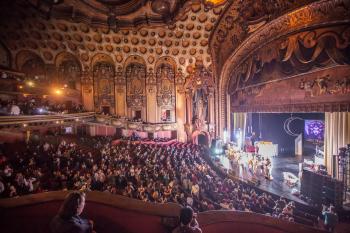
One of the key elements of the Bringing Back Broadway initiative was the “Night On Broadway”  event, started in 2015 where several blocks of Broadway were closed to traffic for a free arts and music festival. The event continued annually, with an area of eight by three blocks closed to traffic for the day, and permitted access to over half of the historic Broadway theatres, some of which were not generally accessible to the public.
event, started in 2015 where several blocks of Broadway were closed to traffic for a free arts and music festival. The event continued annually, with an area of eight by three blocks closed to traffic for the day, and permitted access to over half of the historic Broadway theatres, some of which were not generally accessible to the public.
Attendance at Night On Broadway in 2015 was 35,000, swelling to 60,000 in 2016 and 75,000 in 2017, then ballooning to 250,000 people in 2018. The following theatres participated in the most recent (2018) Night On Broadway:
The event went on hiatus for 2019 and promised to return in 2020, however the Covid-19 pandemic resulted in no events in 2020 or 2021.
In early 2019 Langdon Street Capital, who had recently bought the Million Dollar Theatre along with the adjacent Grand Central Market  , submitted an application to nominate the Million Dollar Theatre for Historic-Cultural Monument status with the City of Los Angeles.
, submitted an application to nominate the Million Dollar Theatre for Historic-Cultural Monument status with the City of Los Angeles.
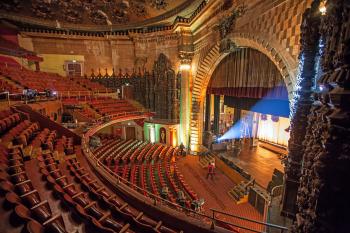
The Los Angeles Historic Theatre Foundation  helped facilitate the nomination, and in early July 2019 the Los Angeles City Council voted unanimously in favor of granting the theatre Historic-Cultural Monument status. As of 2021 and following the Covid-19 pandemic, the theatre is used as both a church and as a regular location for screening movies.
helped facilitate the nomination, and in early July 2019 the Los Angeles City Council voted unanimously in favor of granting the theatre Historic-Cultural Monument status. As of 2021 and following the Covid-19 pandemic, the theatre is used as both a church and as a regular location for screening movies.
The Tower Theatre was under renovation for several years however reopened in June 2021 as a flagship Apple store: the Apple Tower Theatre  . The renovation included a seismic retrofit of the entire building, a faithful recreation of the theatre’s original 1927 marquee on Broadway, a recreated ornamental cap at the top of the clock tower (removed after severe damage caused by the Sylmar / San Fernando Earthquake in February 1971), and an accessible area dedicated to the renovation project highlighting techniques used in the restoration and replication processes.
. The renovation included a seismic retrofit of the entire building, a faithful recreation of the theatre’s original 1927 marquee on Broadway, a recreated ornamental cap at the top of the clock tower (removed after severe damage caused by the Sylmar / San Fernando Earthquake in February 1971), and an accessible area dedicated to the renovation project highlighting techniques used in the restoration and replication processes.
In late 2023, long-term tenant of the Globe Theatre, Erik Chol, was evicted by his landlord. Whatever the disagreement was, Chol’s management of the Globe Theatre, which had brought diverse sell-out crowds to Broadway multiple nights per week, is now sorely missed. As of late 2024 the theatre space is still seeking a new tenant.
In the Fall of 2024 it was announced that a new street festival called Broadway Night Lights  would come to Broadway. The event would be presented by then councilmember Kevin de León. Broadway Night Lights took place on Saturday 12th October 2024 and saw several blocks of Broadway being closed for a street festival reminiscent of Night On Broadway, with three historic theatres opened for free events: the Los Angeles Theatre, the Palace Theatre, and the Million Dollar Theatre. Crowds were estimated at 50,000 however as of late 2024 no official attendance figures have been published.
would come to Broadway. The event would be presented by then councilmember Kevin de León. Broadway Night Lights took place on Saturday 12th October 2024 and saw several blocks of Broadway being closed for a street festival reminiscent of Night On Broadway, with three historic theatres opened for free events: the Los Angeles Theatre, the Palace Theatre, and the Million Dollar Theatre. Crowds were estimated at 50,000 however as of late 2024 no official attendance figures have been published.
The Los Angeles, Palace, Tower, and State theatres are still owned by the Delijani family and are managed by the Broadway Theatre Group  , aside from the Tower Theatre which is long-term rented to Apple for their Downtown Los Angeles Apple Store
, aside from the Tower Theatre which is long-term rented to Apple for their Downtown Los Angeles Apple Store  . The State Theatre is leased to a church however the Palace and Los Angeles theatres are available for rent and are programmed for special events. They are also regularly used for movie and television location shoots.
. The State Theatre is leased to a church however the Palace and Los Angeles theatres are available for rent and are programmed for special events. They are also regularly used for movie and television location shoots.
The Orpheum Theatre and the United Theater on Broadway host a healthy variety of events most weeks. The Million Dollar Theatre hosts occasional events in conjunction with its popular neighbor on Broadway Grand Central Market  .
.
As of mid-2024, the Globe Theatre is currently closed and is seeking a new tenant.
The Roxie, Cameo, and Arcade theatres are currently closed but open to re-use proposals. The Rialto Theatre was adaptively reused as an Urban Outfitters store which opened in December 2013.
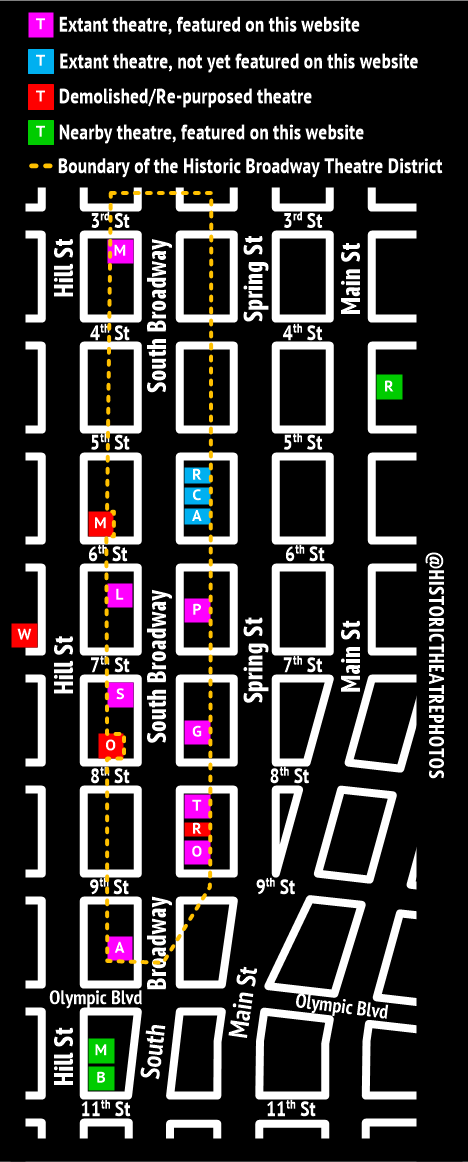
 Video from our YouTube channel:
Video from our YouTube channel: Listed/Landmark Building Status
Listed/Landmark Building Status (12th September 1978, amended 28th June 2001)
(12th September 1978, amended 28th June 2001) How do I visit the Broadway Historic Theatre District?
How do I visit the Broadway Historic Theatre District?The Los Angeles Conservancy  runs weekly tours of the Broadway Historic Theatre District. Subject to availability, the tour visits the interiors of one or more of the following theatres: Los Angeles Theatre, the United Theater on Broadway (formerly United Artists Theatre), Orpheum Theatre.
runs weekly tours of the Broadway Historic Theatre District. Subject to availability, the tour visits the interiors of one or more of the following theatres: Los Angeles Theatre, the United Theater on Broadway (formerly United Artists Theatre), Orpheum Theatre.
Access is not guaranteed to any theatres due to events programming and logistics on the day so call ahead for details if you are concerned.
Tours run every Saturday at 10am and last approximately 2.5 hours. Tickets $10.
 Further Reading
Further Reading on the Los Angeles Theatres website.
on the Los Angeles Theatres website. guide to the Broadway Theatre District
guide to the Broadway Theatre District  .
. and supporting photographic file
and supporting photographic file  .
. and supporting photographic file
and supporting photographic file  .
. Photos of the Broadway Historic Theatre District
Photos of the Broadway Historic Theatre DistrictPhotographs copyright © 2002-2026 Mike Hume / Historic Theatre Photos unless otherwise noted.
Text copyright © 2017-2026 Mike Hume / Historic Theatre Photos.
For photograph licensing and/or re-use contact us here  . See our Sharing Guidelines here
. See our Sharing Guidelines here  .
.
| Follow Mike Hume’s Historic Theatre Photography: |  |
 |